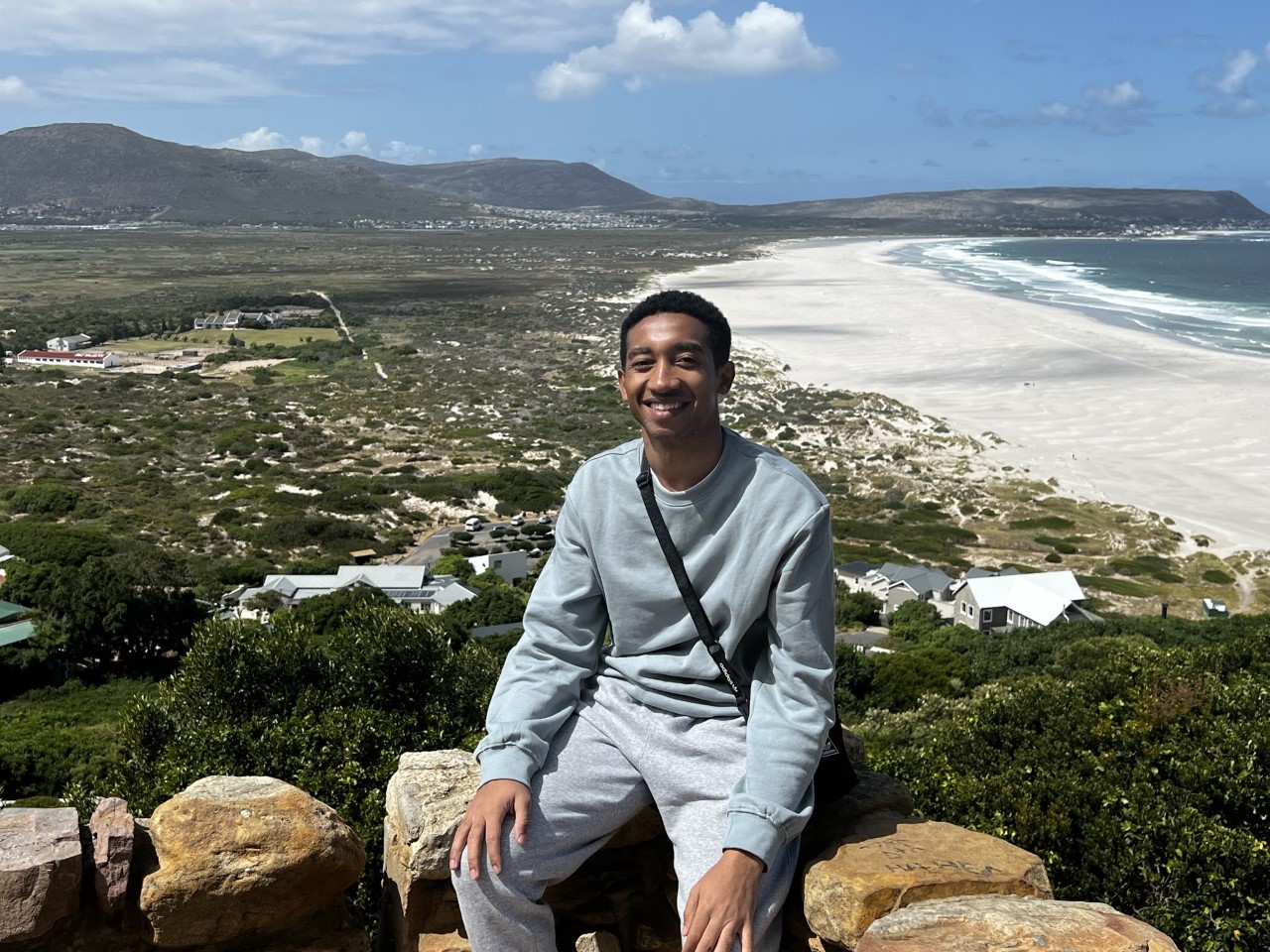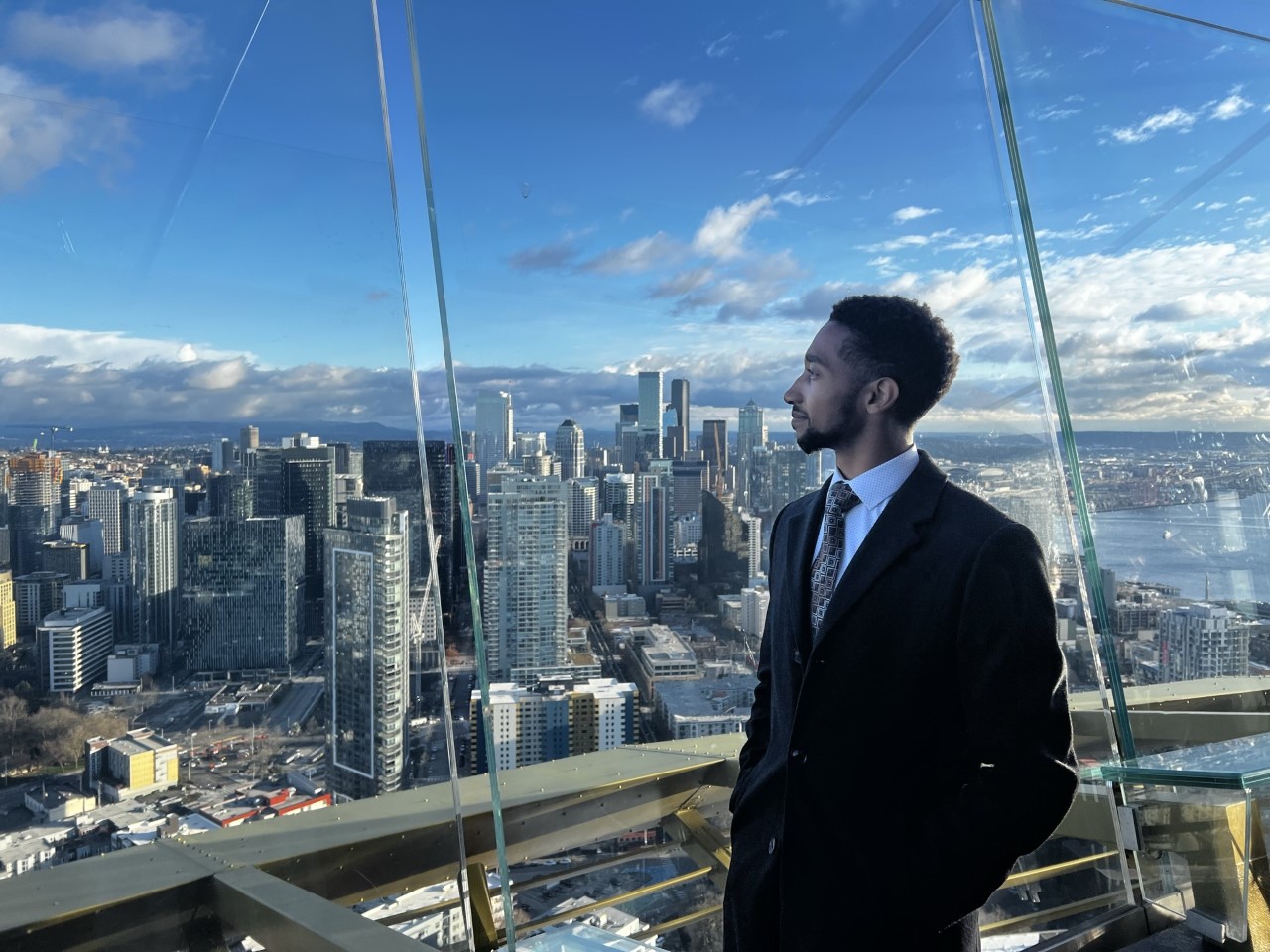
Scholar-Elect Christopher Slaughter talks about his engineering research and his commitment to widening access to medical technology
There is beauty in a society where people can come together and not feel alone. We give people the support they need so they don’t fall through the cracks.
Christopher Slaughter
Christopher Slaughter grew up surrounded by academia as his mother completed her PhD. He saw how dedicated she was to her studies and serving her community and he plans to follow in her footsteps as a global ambassador for access to affordable healthcare.
Christopher [2023] will begin his PhD in Engineering in the autumn and will work in Cambridge’s bioelectronics laboratory under Professor George Malliaras on technology, which can track the progression of neuromuscular diseases such as muscular dystrophy. He aims to ensure that the technology is available to people in low-resource settings.
A life of service
Christopher was born in Richmond, Virginia, and grew up watching his mother – who he calls his biggest hero – doing her PhD in Computer Engineering and research in Bioelectronics at Virginia Commonwealth University and helping K-12 students in the Richmond area pursue a career in STEM. “Seeing her made me choose a life dedicated to service,” he says. “My underlying goal is to live a life where I can give back and serve the communities that have given so much to me.”
 Those communities span West Africa, Europe, and the US: Christopher’s grandmother on his father’s side is German and his mother is from Ghana. Christopher visited family there as a child, seeing first hand how poverty affects the lives of people in small villages, particularly their health. “That experience really showed me the value of creating affordable medical technologies to help people in low-resource settings,” he says.
Those communities span West Africa, Europe, and the US: Christopher’s grandmother on his father’s side is German and his mother is from Ghana. Christopher visited family there as a child, seeing first hand how poverty affects the lives of people in small villages, particularly their health. “That experience really showed me the value of creating affordable medical technologies to help people in low-resource settings,” he says.
His father worked in chemical and metal manufacturing to support his mother through her studies and later studied for bachelor’s and master’s degrees in information systems at the University of Maryland, Baltimore County [UMBC] himself. Christopher’s brother, Joshua, now a Marshall Scholar, is doing a PhD in Bioinformatics at the University of Edinburgh. Discussions around the family dinner table about research gave Christopher and his brother a unique perspective on academic life from an early age.
At school, however, Christopher says he was not a natural at STEM subjects like his parents and brother. He had to work at them. “Ultimately, my academic career is a testament to the value of perseverance and hard work,” he says. He benefited from a STEM programme his mother directed at Virginia State University, one of the US’ historically black colleges and universities, which aimed to encourage underrepresented students into science and engineering. Outside of school, he was also very active in sports such as basketball, soccer and martial arts.
Computer science
When he graduated from high school, Christopher applied successfully to the Meyerhoff Scholars Program at UMBC to do a degree in computer engineering. The programme, which also aims to increase representation in STEM for underrepresented groups, gave him a lot of guidance and support. He soon recognised that there were not a lot of African Americans studying STEM subjects and he was keen to build a supportive community.
Christopher was motivated to pay back the support he received. Over his undergraduate years, he became chapter secretary and then chapter president of the National Society of Black Engineers, which aims to get more African American and Black students into STEM and engineering. “There is beauty in a society where people can come together and not feel alone. We give people the support they need so they don’t fall through the cracks,” says Christopher. “There is always someone you can study with or rely on for resources at UMBC.”
He presided over the society when it was growing fast and expanding its leadership team, as well as its outreach work with local schools which aimed to encourage students to apply to university. In addition, the society ran a lot of events and workshops.
The road to Cambridge
 Christopher’s university community encouraged him to apply to Gates-Cambridge Scholarship and the US National Science Foundation’s Graduate Research Fellowship Programme and he was awarded both. Knowing he wanted to travel and experience different perspectives on science, given his global upbringing, Cambridge was the most attractive option.
Christopher’s university community encouraged him to apply to Gates-Cambridge Scholarship and the US National Science Foundation’s Graduate Research Fellowship Programme and he was awarded both. Knowing he wanted to travel and experience different perspectives on science, given his global upbringing, Cambridge was the most attractive option.
Until he arrives at Cambridge, he will continue to work on the research project which has occupied his last two and a half years and is based in the UMBC Centre for Advanced Sensor Technology, a multidisciplinary group dedicated to promoting the development of optical-based sensors for biomedical, bioprocess, environmental and homeland defence applications. The centre has a focus on creating affordable and sustainable health technology.
Under the supervision of Dr Govind Rao, Christopher has been working on a non-invasive glucose monitoring project, which aims to capture the fluorescence of proteins when they bind to glucose so the concentration of glucose present can be quantified without breaking the skin. It would mean people with diabetes would not have to use needles which are susceptible to contamination and infection.
It is Christopher’s first time in a laboratory since COVID. During his time at UMBC, he worked on several research projects during the summer vacation, but they were virtual. The first year was with the University of Southern California and the second was at Tufts, where he assisted with developing classifiers for cognitive workload. However, he did travel to MIT to participate in a quantitative methods workshop.
Christopher is very much looking forward to starting his PhD. He had been to the U.K. before when his mother visited her mentee, a Rhodes Scholar at Oxford University. “She was an inspiration to me,” he says. “I thought if she can do it, why not me?”
After obtaining his PhD, Christopher says he plans to direct his own research centre, work with policymakers and become a global ambassador for access to healthcare technologies.
*Top picture credit: Marlayna Demond ’11/UMBC.












